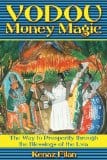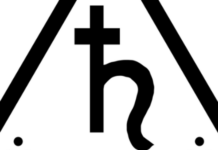
Vodou Money Magic: The Way to Prosperity through the Blessings of the Lwa
, by Kenaz Filan
Destiny Books, 9781594773310, 212pp., 2010
While I enjoyed this book it has left me with fairly mixed feelings. Many parts of the book I really liked and appreciated, but there were also parts that just rubbed me the wrong way. I’ll first air my issues then continue with the rest of the book.
Hoodoo is a cousin, so to speak, to Vodou and related traditions, but Hoodoo is a system of magick, where as Vodou is a religion. This book seemed like it was advocating a personal devotional religion for financial aid. It just seemed to be going the wrong direction, imagine “Join the Church, learn how Jesus can get you money” as a parallel, and that’s what felt off with the book. The religion is one of dedication and personal relationships, and I think undertaking such a relationship only for financial gain is the wrong path. “The better you understand Vodou’s roots, the more effectively you will use Vodou to your advantage.”1 This is sound advice, but a touch muddled by having this book as an intro to the religion, and focused on money magick, not the practices as a whole. As a bibliophile and researcher I was also put off by Filan constantly referring the reader to other books ey wrote for more information, rather than an outside source; other references were included in the bibliography, but no way to know what information came from where.
In the introduction Filan mentioned that “Keys to wealth are as thick on the ground as ultimate weight-loss guides”2 and my first reaction was to wonder: what makes this book any different? It took 90 pages, or half the book, to get an answer but it was there. The first half of the book was a good history of Vodou, the African slave trade, the differences in thought and the influences that different cultures and times had on the religion.
When the book actually got into the magick, what made it different became apparent. Filan held the rational view that “Magic is a supplement to common sense and hard work, not a replacement for them”3 and many of the rituals displayed that point. The book does not contain a variety of get rich quick spells, but instead a wealth of fairly specific and down to earth rituals. Spells to get people to pay you back, rituals to help you plan financially, how to keep things pleasant and civil with bosses and coworkers, how to magickally attract business, break compulsive spending patterns, even a spell to help out sex-workers with attracting the right kind of Johns.
“My goal here has been to work long-lasting and pervasive changes in your financial condition.”4 This is what Filan managed to do, the spells were very practical, and specific; they weren’t about setting out random intentions to have money, or trying to influence the lottery but were clear in how the world was going to deliver. Alongside the rituals was some very simple, and non-preachy, practical advice, recommending readers to groups like Debtors Anonymous or Gambling Helplines if that is where their problem lies.
The book tackled with why people do money magick, why some don’t, and some philosophy around money magick and our interactions with others. At very least this book is a great reference for ideas for very specific rituals regarding very specific financial problems, and if others don’t seem to have the same qualm I did with the religious marketing, or are already involved with the faith then this books is a great source for that as well as the financial aid.







